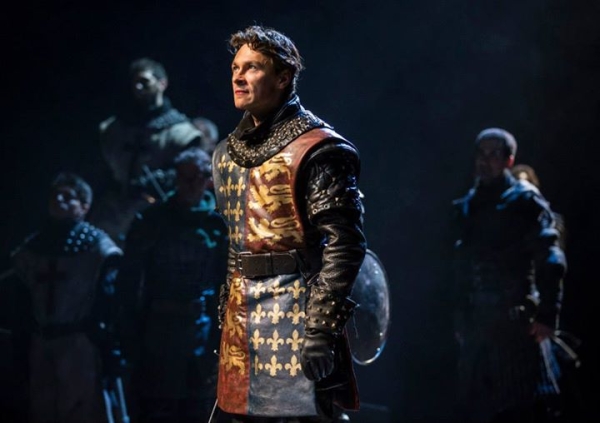
(© Liz Lauren)
Under the direction of Christopher Luscombe, Henry V continues Chicago Shakespeare Theater's long history of making the Bard's words as accessible as an Instant Message. Henry's story is told with clarity and beauty. That's the plus side of things here. On the minus end? Henry V lacks the crucial, propulsive urgency that's absolutely necessary to a narrative that arcs with a legendary battle. It's pleasant, and pleasant isn't really what you want in a tale of titans clashing and epic bloodshed.
Henry V's plot isn't one of Shakespeare's more overly complex. Essentially, the French and the English both lay claim to the same lands. Henry has a royal legitimacy his father lacked, since the the son inherited the crown and the father wrested it from others. But Henry is young and relatively untried, still in spitting distance of a wild youth spent carousing in taverns with his motley crew of hard-drinking, semi-criminal friends. A decisive victory over France would help solidify the monarch's status as, well — a monarch and not a youthful wastrel. So off he goes to war, rallying the troops into battle for God, King, and Country.
The chief problem is with Henry himself. As the titular ruler, Harry Judge is curiously understated. Would you follow Henry into battle? That's the critical quality-control question for any staging of Henry V. In this instance, the answer is no. This Henry is somebody you'd have dinner with. But go charging once more into the breach with? Not so much. Judge is likable rather than inspiring, more amiable than awesome. He seems restrained, and almost offhand at times. It's most notable in the famous St Crispin's Day speech, which lacks the driving crescendo (in both intensity and volume) it needs to be believable as the ultimate pre-battle pep talk.
Judge is so low-key that he's often overshadowed by the supporting characters surrounding him. Among the most vivid of these is Greg Vinkler’s Ensign Pistol, a deliciously comical vainglorious peacock of a man who hides his lily-livered cowardice under a cloak of preening grandiosity. Vinkler commits down to the smallest gesture — you can tell precisely what sort of ridiculously puffed-up fellow Pistol is simply by watching the affected way he holsters his sword.
Equally memorable is Samuel Taylor as the petulant, prissy French Dauphin who sparks Henry’s wrath by sending the monarch the insulting gift of a barrel of tennis balls. Taylor’s Dauphin is the very picture of entitlement and privilege, a spoiled, clueless, 20-something brat behaving more like a Kardashian than a king-in-waiting. His expression is one of somebody who just bit into a bad clam — such is the disdain with which he views the lesser mortals he deigns to associate with. Then there’s Larry Neumann Jr.’s Corporal Nym, a greasy-haired scalawag with a permanent scowl and a hair-trigger temper.
Henry V also benefits from a massive and marvelous set design by Kevin Depinet. The fall of the French becomes literal in a tower the size of a brownstone that is embossed with fleurs-de-lis and sent plummeting toward the ground as the war begins. Visually, the tumbling tower is an indelibly dramatic image, and one that rightly drew gasps on opening night. Philip S. Rosenberg’s lighting design is similarly evocative, creating a series of stage pictures that are absolutely cinematic.
As for Matt Hawkins’ fight choreography, it is superb. The violence is stylized to be sure, but it is also breathtaking. Depicting the tragedy and the all-but-unbearable tension of war with a cast of under two dozen is usually a thankless task, but Hawkins succeeds mightily. The battle scenes are simultaneously chaotic and balletic, and they drive home the frenetic violence that defines bloodshed on a massive scale.
In all, there’s a lot to like about Henry V, including costume designer Mariann S. Verheyen's elaborate, runway-ready array of leather doublets, bodkins, and breeches. But with a tepid Henry, the guts are missing from the play. The stage pictures are often glorious, but they aren’t centered on the white-hot young King who instigates them.
I can't quite put my finger on when, but at some time during the last 15 or so years, Chicago Shakespeare's homegrown productions (as opposed to the World Stage series that imports productions from around the world) veered from being revelatory to being merely accessible. Accessibility, to be sure, is a crucial element. But it should come hand in hand with something more. In the case of Henry V, that something more is a Henry who is no less than astonishing. That’s lacking here, and the lack diminishes what could have been a fine production indeed.









